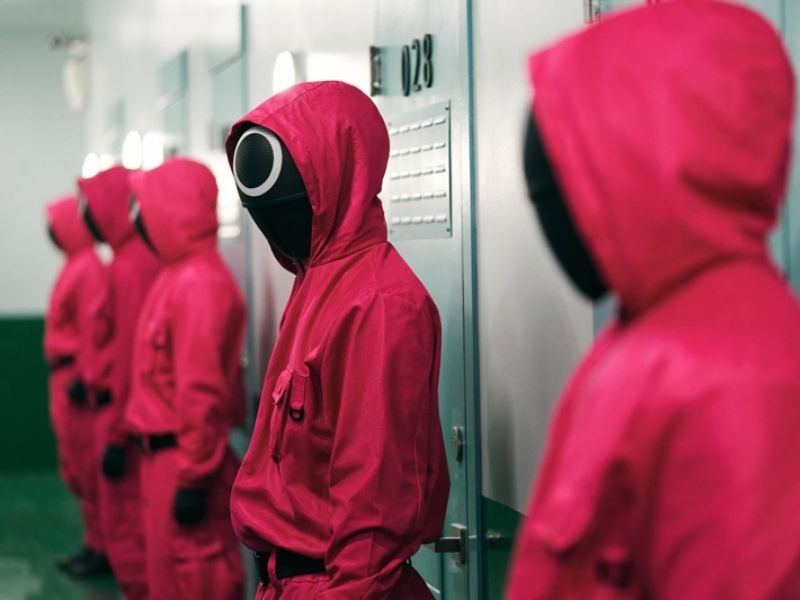Netflix’s Squid Game is a gory and terrifying K-Original that is no different than any other survival thrillers that we have seen. It sees a group of 456 strangers are betting their lives against whopping prize money of 45.6 billion Korean Won, which amounts to nearly $40 million. They find themselves wandering through an open maze into a field from where the games begin. Those who defy the game’s rules are killed, as are the ones who fail to complete their assigned mission.
Directed by Hwang Dong-hyuk, the series stars Lee Jung Jae, Park Hae Soo, Jung Ho Yeon and Wi Ha Jun. Forced into a confined space, with a flurry of shapes, including squares, circles and triangles, the participants are being watched closely by the panoptic gaze of unknown and sinister forces hidden under masks and overalls.
The series is perhaps one of the greatest K-Dramas on Netflix and has already garnered a huge fan following since its premiere on September 17th, 2021.
The premise of the series shows people fighting for survival. They are frustrated, desperate and vulnerable. While some need the money to repay gambling debts, others need it for their family. The characters in the drama do not feel alien to us as their backstories are dexterously woven into the plot. Their predicament of humanity unfolding makes the watch even more sinister and riveting, with the anonymous overseer of the game appearing as dangerous as Jigsaw in Saw. To him, the dead and the alive are no different. He is merciless and wants to check their level of desperation.
The series is a critical commentary on the power-hungry sharks in whose hands money and power are monopolised. The series is a subtle critique of the human condition. While it highlights how human beings’ greed, selfishness, and absolute despicable emotions come to the fore when they are threatened, it also highlights how desperate times call for desperate measures. Instead of criticising some of the character’s selfish choices, they justify it by showing how everyone is rushing to save their kin. The only people who remain at the receiving end of the harsh critique are the power-mongers. Each of the characters retains their agency to make their choices, which, no matter how vile, remains portrayed via a sympathetic and neutral lens while harshly criticising the self-centred position and mentality of the ones who can wield power in this raging capitalistic society.
While the game cleverly uses the titular and popular children’s game from the ’70s and ’80s Korea to show the game of tag, across the nine episodes, they uphold the same feeling of paranoia, tension, frenzy, and madness across the nine episodes. It is indeed an irony to see such an innocent child’s game turn out to be a nightmarish experience for the participants. Whether you opt for the sub or dubbed version, the spine-chilling horror and tension pervade the whole show. The general aura of hopelessness adds to the symbolic meaning that constantly plays with free will and control in a world that believes in the Darwinian theory of the survival of the fittest.
What makes the series even more horrifying is its relatability. Unlike other survival thrillers that are usually set in a dystopian setting and are supposed to be a commentary on contemporary times, the series is set in the present moment, giving a tour through various neighbourhoods in Seoul. The context is current; the bleak futures of the participants are embedded in reality. Their desperate condition is heightened tenfold due to how scary and relatable it is. Might as well have been any of us fighting in the game, right?
Squid Game is filled with plot twists and suspenseful meandering subplots that add to the perverse and nightmarish take on a seemingly innocent game. Although the ending isn’t the finest moment of the series, we are desperately hoping for a second season to dive into again. Hopefully, with the show currently gathering a 100% rating on Rotten Tomatoes, the film will get a green signal from Netflix. Also, watch out for a much-awaited Gong Yoo cameo.
